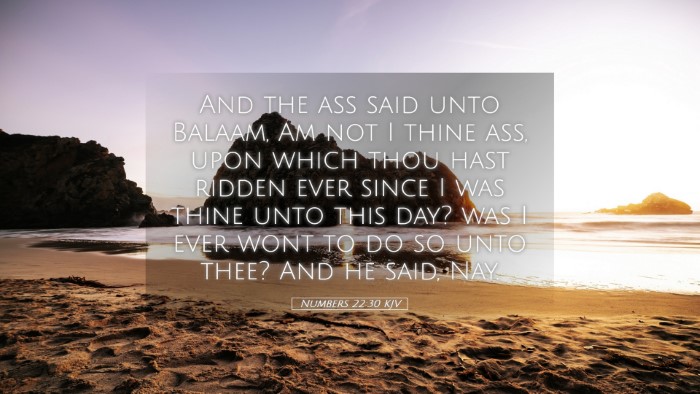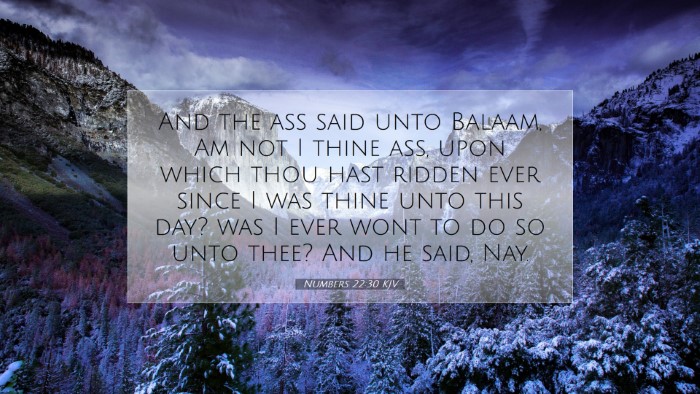Commentary on Numbers 22:30
Numbers 22:30 narrates a remarkable incident involving Balaam and his donkey,
offering significant theological and ethical insights that are relevant for pastors,
students, theologians, and Bible scholars alike.
Text of Numbers 22:30
"And the donkey said to Balaam, 'Am I not your donkey on which you have ridden
all your life long to this day? Is it my habit to treat you this way?' And he said,
'No.'" (Numbers 22:30, ESV)
Contextual Background
This verse occurs within the broader narrative of Balaam, a non-Israelite prophet.
He is summoned by Balak, the king of Moab, to curse the Israelites.
With the backdrop of divine providence and judgment, this story sheds light on themes
of obedience, divine revelation, and the nature of human folly.
Insights from Public Domain Commentaries
1. Matthew Henry's Commentary
Henry observes that the incident with the talking donkey serves not only as a
miraculous event but also highlights the absurdity of Balaam's situation. He notes
how God uses a creature considered of lower status to deliver a profound message
to a man who is being obstinate. Henry emphasizes that God can use whatever means He
chooses to confront human folly—pointing to the donkey's question as a moment of
reflection for Balaam.
Furthermore, Henry suggests that the donkey acts as an agent of God, underscoring
the principle that the Lord can express His will through unlikely instruments,
thus revealing both His sovereignty and the depths of man's rebellion.
2. Albert Barnes' Commentary
Barnes provides an exegesis focusing on the striking reality that God opened the mouth
of the donkey, enabling it to speak human language. This points to the miraculous
intervention of God, emphasizing His dominion over creation. Barnes notes that this
event serves as a warning to those who are willfully blind to God’s commands and
purposes.
Barnes also highlights Balaam’s failure to recognize the divine hand at work in his
life, ultimately leading to his own spiritual blindness. The donkey questions Balaam
to invoke a moment of self-reflection, revealing sin and disobedience in Balaam’s heart.
3. Adam Clarke's Commentary
Clarke elaborates on the dialogue between the donkey and Balaam, noting that the
animal expresses a sense of loyalty and consistency in its service to its master.
He points out that the donkey represents an unrecognized wisdom that surpasses
Balaam's understanding. Clarke suggests that the donkey's words are critical because
they express a level of reasoning that Balaam, with all his intelligence, fails to grasp.
Clarke interprets the donkey's emotional appeal—“Is it my habit to treat you this
way?”—as a means to evoke remorse and self-examination in Balaam. This highlights the
significance of recognizing the ordinary as extraordinary when viewed through the
lens of divine intervention.
Theological Implications
The account of the talking donkey raises important theological issues, particularly
regarding God’s sovereignty and His capacity to control all aspects of creation. It
illustrates that God can choose any means, whether natural or supernatural, to
communicate His will and purposes. This narrative challenges the reader to consider
how often they resist God’s direction and how the Lord might be speaking through
unconventional channels.
Moreover, the irony of Balaam—a prophet—being confronted by a mere donkey echoes
the biblical motif of God raising the humble and meek to confound the wise and
powerful. This incident draws attention to the subtle ways in which God seeks to
correct and guide His people, even employing the most unexpected instruments.
Practical Applications
- Humility in Leadership: Leaders and spiritually mature individuals must embody humility
and be sensitive to the various ways God may communicate His will, even through those
they might consider less significant.
- Avoiding Spiritual Blindness: Like Balaam, individuals must guard against blind
ambition that overrides obedience to God’s mission.
- Recognizing God’s Voice: This passage encourages discernment in recognizing
God's voice amid noise, distractions, and personal desires.
Conclusion
In summary, Numbers 22:30 compels us to confront our own spiritual awareness and
responsiveness to God. Through the remarkable dialogue between Balaam and his donkey,
we are encouraged to reflect upon our relationship with God, the means by which He
communicates with us, and the profound truth that often, wisdom may be found in the
most unexpected places.


